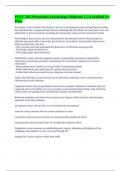PSYC 305 Personality Psychology Midterm 1 || A Verified A+
Pass.
Personality correct answers Personality is the set of psychological traits and mechanisms within
the individual that is organised and relatively enduring and that influences interactions with, and
adaptations to the environment, including the intrapsychic, physical and social environment.
Psychological traits correct answers characteristics that describe ways in which people are
different from each other or how they are similar to some others; characteristics that seem to
define an individual over time
- They describe and help understand the dimensions of difference among people
- They help explain the behaviour
- They help predict future behaviour
Mechanisms correct answers cognitive aspects of personality/ processes of personality:
information processing, perception, processing the environment, response to processed
information
- Makes people more sensitive to certain kinds of information (input)
- Makes them think more about specific options (decision rules)
- Guides their behaviour toward certain categories of action (output)
Within the individual correct answers occurs internally, individual carries with themself to
different places and situations
Organised correct answers personality traits are not a random collection of elements, they are
organised and work together in a way to produce a functioning human being, make decisions,
satisfy needs etc (disorganised: dysfunctional/ people with disorders)
Relatively enduring over time correct answers core feature; stable over time and situations,
important to ask how enduring
perceptions correct answers how we see/interpret the environment
selection correct answers how we choose situations to enter
evocations correct answers reactions we unintentionally produce in others
manipulations correct answers how we intentionally influence others
Adaptations correct answers accomplishing goals, coping, adjusting and dealing with the
challenges and problems we face as we go through life.
Intrapsychic correct answers within your mind
,physical correct answers surrounding; can pose challenges, we have developed physical
mechanisms as inventive solutions (hunger pangs, taste preferences, fear of heights etc)
social correct answers relationships and interactions; the way we encounter the social challenges
we face are central to an understanding of our personality. Personality loses meaning without the
social context
What is personality not correct answers a correlation exists: but it is not attitudes (no biological
correlation, easy to change depending on personal experience), specific morals, values, beliefs,
cognitive or other abilities; intelligence is measured by optimal performance, physical
characteristics, social categories
Levels of analysis: Human nature (universals) correct answers How we are like all other humans
Traits typical of everyone in our species
These traits are evolutionarily successful and helpful over many generations, come to define all
of us
Individual and group differences (particulars) correct answers How we are like some other
humans
Group differences correct answers a large sample of individual differences and measures of
personality traits and compare them statistically to another group, how people from one group
are similar/different to people in another group
Individual differences correct answers ways in which each person is like some other people due
to their personality traits
Individual uniqueness (uniqueness) correct answers How we as individuals are like no other
people, refers to how every individual has personal and unique qualities not shared by any other
person in the world. The uniqueness exists in the sum of our traits and mechanisms in their
combinations and interactions; rather than an individual trait by itself. It also exists in our
narrative identities
Nomothetic research correct answers a statistical comparison of individuals or groups, requiring
samples to identify universal human characteristics and dimensions of individual or group
differences
Idiographic research correct answers focuses on a single subject, trying to observe the general
principles that are manifest in a single life over time
Grand theories of personality correct answers address the human nature level of analysis, provide
a universal account of the fundamental psychological processes and characteristics of our
species.
, Dispositional domain correct answers the way in which individuals differ from one another, the
origins of these differences, how they develop and how they are maintained; interest in the
number and nature of fundamental dispositions
Biological correct answers genetics (genetic underpinnings of personality), psychophysiology
(the basis of personality based on nervous system functioning), evolution (traits of human
personality have evolved over thousands of years because they were effective in solving adaptive
problems linked to survival and reproduction; functional aspects of personality)
Intrapsychic correct answers mental mechanisms, operating outside of conscious awareness
Cognitive-experiential correct answers cognitive and subjective experience; goals we strive for;
emotions
Social and cultural correct answers personality is not something that merely resides within our
heads, nervous systems and genes, it is affected by and affects social and cultural context
Descriptive research correct answers Used to describe personality
Self-report Data correct answers unstructured, structures, Likert-type scale, Forced choice
response formats
- Information provided through a survey/interview. Individuals know the best about themselves
than anyone else, inaccessible to anyone else. Beneficial despite the limitations (social
desirability: the need to be perceived as desirable, deception) ex. NEO-FFI: a measure of the Big
5 personality traits
Observer report Data correct answers naturalistic v artificial, professional assessors, family,
friends
- Information provided by someone else about another person, access to information not
available through other sources, multiple observers on the same person, mainly to control for
reflection before data collections.
- Can assess multiple social personalities
Limitation: biased, inter-rater reliability: evaluate the degree of agreement among other
observers
Test Data correct answers physiological measures, activity or energy levels, examining the
control of the leadership, measuring IQ, Rorschach inkblot tests
- Information provided by standardized test or testing situations to see if people behave
differently in identical situations. The situation is designed to elicit behaviours that serve as
indicators of personality. Elicited behaviour is "scored" without reliance on inference. Responses
are standardized, can be compared over a variety of samples. Often consumed with optimal
performance, unlike others where you collect over average behaviour/experience over time.
Life History Data correct answers Information gathered from events, activities and outcomes in a
person's life available for public scrutiny ex marriage-neuroticism, speeding tickets-impulsivity




